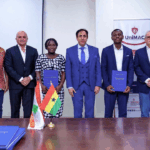
The Embassy of Lebanon, in collaboration with the Lebanese Community and the University of Media, Arts and Communication (UniMAC), has held its annual research seminar for postgraduate students.
The event, designed to sharpen the professional skills of beneficiaries of the Lebanese Scholarship Programme, brought together the Lebanese Ambassador to Ghana, Maher Kheir, UniMAC officials, members of the Lebanese community, and postgraduate students.
The seminar provided a platform for students to present their research findings, with a focus on comparative analyses of Lebanese and Ghanaian topics, while proposing practical solutions.
Ambassador Kheir commended the students for exploring diverse cultures as a way of bridging the gap between Ghana and Lebanon.
“Education has always been central to Lebanon’s identity. It shapes minds, opens doors, and builds bridges across cultures.
Through these scholarships, Lebanon shows its commitment to supporting young people who carry the promise of leadership and service,” he said.
He stressed the importance of research and cultural cooperation in nation-building and urged the students to “keep aiming higher, and always remember that education is not just for personal growth, but also for serving communities and humanity at large.”
Director of the Centre for Global Education and Collaboration (CGEC), Dr. Lawrencia Agyapong, expressed gratitude for the Embassy’s continuous support.
She praised Ambassador Kheir for launching the seminars and research programme four years ago as part of the scholarship scheme, describing it as a valuable contribution to academic cooperation.
She also appealed for internship opportunities for UniMAC students at the Embassy.
Dean of the School of Graduate Studies and Research, Dr Benedine Azanu, lauded the Lebanese Community for more than a decade of partnership, which she said has produced academics, scholars, and industry leaders across the journalism and media fields.
She appealed for an increase in the number of scholarships as UniMAC expands and proposed further collaboration with Lebanese universities to boost cultural exchange.
On behalf of the Lebanese Community, Naaman Ashkar praised the students’ research, noting that it offered valuable insights for academia, industry, and Lebanese businesses.
He highlighted cultural integration as a continuing challenge for the Lebanese community in Ghana and encouraged the students to draft a guiding document to support integration efforts.
This year’s participating students – Priscilla Amoah, Antoinette Osei Banahene, and Richard Gyamfi Sarfo – presented research on topics including media representation, media coverage, and the cultural identity of the Lebanese community in Ghana.
Ambassador Kheir encouraged them to remain curious in their pursuit of knowledge. “Each one of you has demonstrated remarkable commitment. Continue to ask questions, refine your ideas, and broaden your horizons,” he said.
The Lebanese Scholarship Programme, now in its 12th year, has awarded scholarships to more than 600 students across disciplines, including law, journalism, media, languages, performing arts, public relations, and film and television production.
Last year, the programme marked its 10th anniversary with the launch of the Lebanese Scholarship Alumni Network (LESAN), a social impact organisation focused on humanitarian projects.